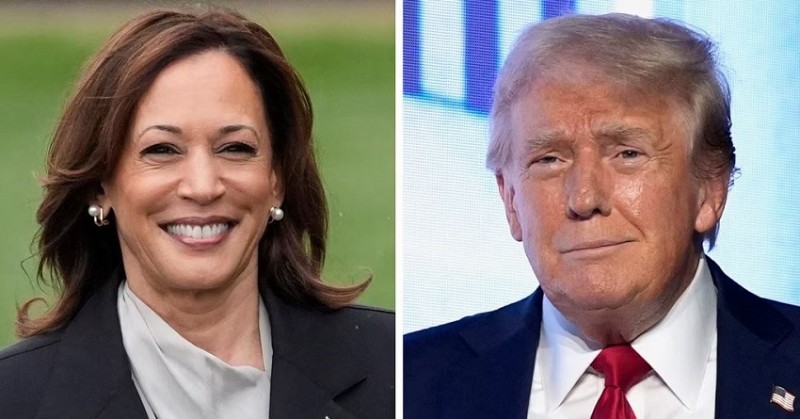
Two days after President Joe Biden signed an extensive executive order on artificial intelligence last year, Vice President Kamala Harris took the significant document to a global AI summit. Addressing an international audience, Harris highlighted what sets the U.S. apart in its approach to AI safety.
At the event focused on the potential risks of future AI developments, Harris brought attention to present-day issues and the urgency of establishing protections without stifling innovation. "When a senior is kicked off his healthcare plan because of a faulty AI algorithm, is that not existential for him?" Harris asked the crowd in London last November. "When a woman is threatened by an abusive partner with explicit deepfake photographs, is that not existential for her?"
Now, as she runs for president, her main opponent, former President Donald Trump, has pledged to "cancel" Biden's order. Trump's running mate, Ohio Senator JD Vance, also has his own views on AI, influenced by his connections to some Silicon Valley figures who advocate for minimal AI regulation.
AI's increasing presence in daily life has made it a hot topic, though not yet a top concern for American voters. However, this election could see candidates forming distinct visions on how to guide American leadership in this rapidly evolving field.
Trump's AI Stance
After Biden signed his AI executive order on October 30 last year, Trump quickly indicated on the campaign trail that he would repeal it if re-elected. This promise was included in the platform of this month's Republican National Convention.
"We will repeal Joe Biden's dangerous Executive Order that hinders AI Innovation and imposes Radical Leftwing ideas on the development of this technology," states Trump's platform. "Instead, Republicans support AI Development rooted in Free Speech and Human Flourishing."
During his presidency, Trump didn't focus much on AI, though he did sign an executive order on AI in 2019, directing federal agencies to prioritize research and development in the field. Tech experts had been urging the Trump administration for a more robust AI strategy to keep up with global advancements. In 2017, then-Treasury Secretary Steven Mnuchin dismissed concerns about AI job displacement, saying it was so far in the future that "it's not even on my radar screen."
This perspective evolved, with Trump's top tech adviser later acknowledging that AI-driven job displacement was "inevitable" and stressing that "we can't sit idle, hoping eventually the market will sort it out." The 2019 order called on federal agencies to "protect civil liberties, privacy, and American values" in applying AI technologies and to help workers gain relevant skills.
In the final weeks of his administration, Trump signed another executive order promoting "trustworthy" AI in the federal government, policies that carried over into the Biden administration.
Harris' AI Stance
The introduction of ChatGPT during Biden's presidency made it impossible for politicians to ignore AI. Harris convened the heads of major tech companies like Google and Microsoft at the White House, leading to voluntary commitments from developers to ensure their technology would not jeopardize people's rights and safety.
Biden's AI order utilized national security powers to scrutinize high-risk commercial AI systems, focusing primarily on safeguarding the government's use of the technology and setting standards to foster commercial adoption. Unlike the European Union, however, the U.S. still lacks comprehensive AI regulations, which would require Congressional approval.
Harris, with her deep roots in Silicon Valley, brought a unique perspective to the White House. As California's attorney general, she built relationships with tech leaders, and even before ChatGPT, she was involved in drafting an AI "bill of rights" to protect against the technology's potential harms. At the Global Summit on AI Safety in London, Harris articulated the U.S. AI strategy, emphasizing that protecting the public and advancing innovation are not mutually exclusive.
Vance and the Venture Capitalists
Trump's selection of former venture capitalist Vance as his running mate introduced another layer to the AI debate. Trump has received endorsements from prominent AI-focused tech leaders like Elon Musk and venture capitalists Marc Andreessen and Ben Horowitz.
Vance has recognized some harmful AI applications but expressed concern at a Senate hearing about "preemptive overregulation" that might entrench current tech giants. Andreessen criticized a provision of Biden's order that requires government scrutiny of powerful AI systems based on their computational capabilities.
Andreessen and Horowitz have discussed their support for Trump, emphasizing the need to avoid burdensome regulations that could hinder AI development while other countries, particularly China, advance rapidly. Trump echoed these sentiments, stressing the need for significant electricity resources to maintain AI leadership.
Are Their AI Policies Really Different?
Despite the sharp rhetorical differences, there are significant similarities between how the Trump and Biden administrations have approached AI policy. According to Aaron Cooper, senior vice president of global policy for BSA The Software Alliance, both administrations have sought to balance unleashing AI's potential while minimizing its harms.
Voters have yet to hear detailed plans from Harris or the Trump-Vance ticket on how they would handle AI policy if elected. However, as AI technology continues to evolve, both sides will likely focus on maximizing its benefits and mitigating its risks.
Latest Other News Coverages: